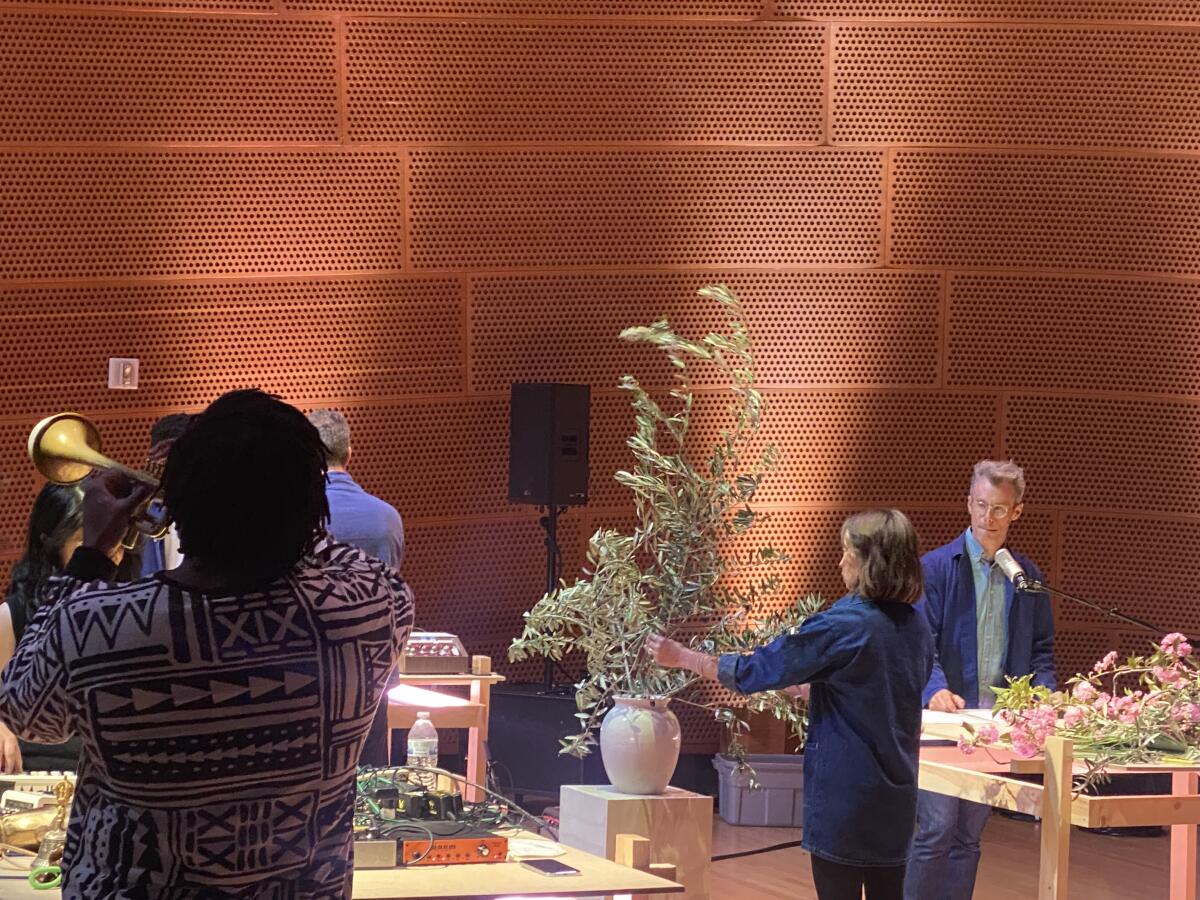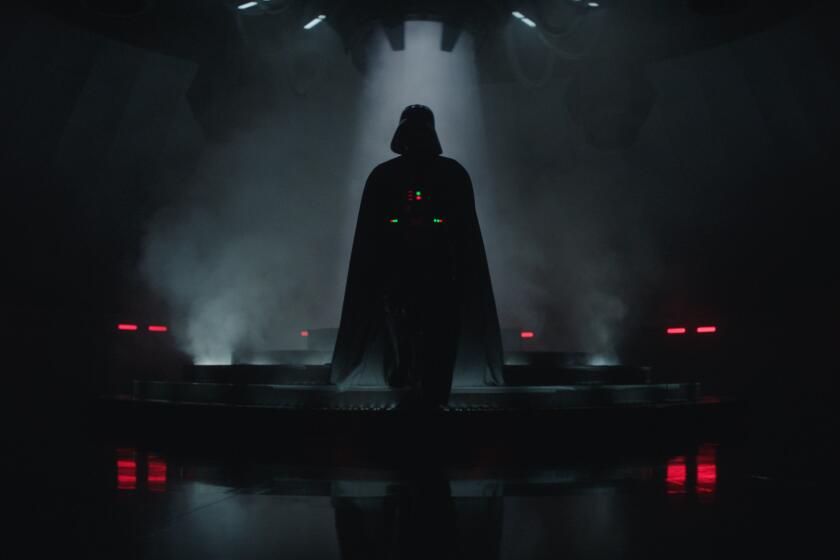L.A. Phil revives ‘Noon to Midnight’ with startling, riotous sound

- Share via
After two years of so many of us perpetually worrying day and night about COVID-19, Walt Disney Concert Hall welcomed audiences back for the sunny afternoon, warm evening and late-night chill of “Noon to Midnight.”
The last time the Los Angeles Philharmonic mounted its annual 12-hour new-music bonanza, the orchestra was on the top of the world. That was June 2019, and “Noon to Midnight” was included in the climax of the L.A. Phil’s unprecedentedly ambitious (and expensive) centennial season. The event was packed into a weekend when Gustavo Dudamel was leading the first performance in the hall of Mahler’s massive Eighth Symphony and preparing a historic production of Meredith Monk’s opera “Atlas,” which served to revive a neglected modern masterpiece.
Two pandemic years later, we might hardly expect a weekend so extravagant. But, somehow, the $100-million-poorer-yet-no-less-irrepressible L.A. Phil managed to pack another “Noon to Midnight” into a weekend when the orchestra was otherwise performing Bruckner’s big Ninth Symphony under Zubin Mehta and preparing a staged production of Beethoven’s opera, “Fidelio,” with Deaf West Theatre. Conducted by Dudamel, that opens Thursday night.
At “Noon to Midnight” on Saturday, five bucks, proof of vaccination and a mask for indoors bought you access to almost everything in, around and about Disney Hall. Only an hourlong evening Green Umbrella concert by the L.A. Phil New Music Group required an additional ticket. Otherwise, there were musicians from all around town playing, ofttimes simultaneously, in the venue’s BP Hall, Keck Amphitheatre, big hall and plaza out front. If you wanted to catch all 12 world premieres (five of them L.A. Phil commissions), you first had to figure out how to be two places at the same time.
Like everyone else, I made my own festival, which meant I missed as much as I heard. Although the vast bulk of the programming was current music, it was bookended by Pauline Oliveros, with the flutist Claire Chase leading the composer’s participatory “Tuning Meditation.” I arrived slightly too late and too detuned by traffic for that. But I was greeted by Southland Ensemble performing Ben Patterson’s “Simple Opera” in BP Hall.
With a motley dozen instrumentalists honking after every phrase, a speaker read a text that stated the opera was simple to compose, is simple to perform, simple to understand and has “no deeper meaning other than to say thank you for this wonderful evening.” The sentiment took.
Meanwhile, outdoors in the amphitheater, pianist Nic Gerpe was playing the first volume of George Crumb’s mystical “Makrokosmos” with astrological evocations accomplished by eerie strumming of the strings, quietly strange harmonies and echoes of Chopin. That began nearly four hours of piano music in the amphitheater.
In the big hall, the Santa Monica new music series Jacaranda Music premiered “Oksoko” by Du Yun, whose new opera, “In Our Daughter’s Eyes,” will be given its first performance by Los Angeles Opera in REDCAT on Wednesday. The sounds of things breaking from explosive percussion entered into a dialogue with a harmoniously unified ensemble of low strings, flute and clarinet.
The most imaginative new piece came later when the L.A. Phil New Music Group premiered Annie Gosfield’s “The Secret Life of Planets: Heavenly Bodies and Earthly Gossip.” This is a riotous 37-minute song cycle that takes off from where the score for her opera “War of the Worlds” left off. When the L.A. Phil premiered that project in 2017, her original musical material was rudely interrupted by the arrival of Martians. Now she’s made up for that.
Written for bass James Hayden as a lounge singer, soprano Hila Plitmann as a voice from outer space and a chamber ensemble, “Secret Life” is the song of planets up to their business. A languorously rotating Venus tumbles down to Earth and hears gossip about Elvis’ bisexuality. A blast from the organ warns us that the Earth is a house on fire, hotter than hell. Jupiter, the oldest planet, is now fat in his later years. Settled into a regular orbit, he throws his weight around capturing everything close to him. Saturn scatters dusk like smoke from a cigarette in a crowded room.
The score is as fabulous as it is true to Gosfield’s planetary premise. The performance, conducted by David Bloom, also proved fabulous.
Then came another unconventional L.A. Phil commission, Chris Kallmyer’s “Song Cycle, Live by Special Request.” Backed up by a pleasingly ambient ensemble called “superteam,” the composer read a text that called forth sounds in the environment. A staging in BP Hall by Zoe Aja Moore consisted of Moore filling a large vase with cuttings.
The sounds Kallmyer suggested in a calm monotone were such everyday occurrences as birds and children and a violin and a chorus. But as he repeated them, they developed into increasingly specific and surprising instances. A violin became one playing at 9 in the morning in an abandoned shopping mall. A wind chime was in an opera house, and it touched a part of you that had never been touched. Wind chimes, as well, rang for an audience that could not stop dancing on a mountaintop. The world, after 40 minutes, grew larger and more enticing.
For the one formal concert, John Adams conducted Louis Andriessen’s “De Staat” with blaring brass, screaming winds, electric guitars and keyboards, a pair of harps and four violas who had little hope of being heard. Four amplified women stridently intoned in Greek bizarre bits from Plato’s “Republic” about which modes are manly and which are not.
The music is repetitive. It is loud. It is adamant. It is controversial. It makes no compromises in its addressing the role of music in society.
“De Staat” was outrageous when the influential Dutch composer, who died last year, completed it in 1976. He delighted in the fact that traditional orchestras would avoid it like the plague. They still do. But the L.A. Phil delighted in its relationship with Andriessen, and this is a startlingly great tribute to a startlingly great composer whose music is capable of blowing the roof off Disney.
There was more to follow: The Monday Evening Concerts prepared an hour of Julius Eastman and, to calm things down, Arvo Pärt, followed by more Oliveros with Chase. Deciding to let near-noon to somewhat-before-midnight end with a bang, I was properly tuned by Andriessen for traffic again, the more aggressive the better.
More to Read
The biggest entertainment stories
Get our big stories about Hollywood, film, television, music, arts, culture and more right in your inbox as soon as they publish.
You may occasionally receive promotional content from the Los Angeles Times.











